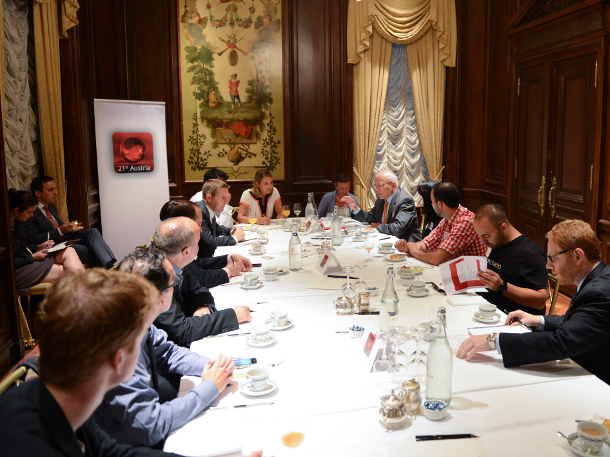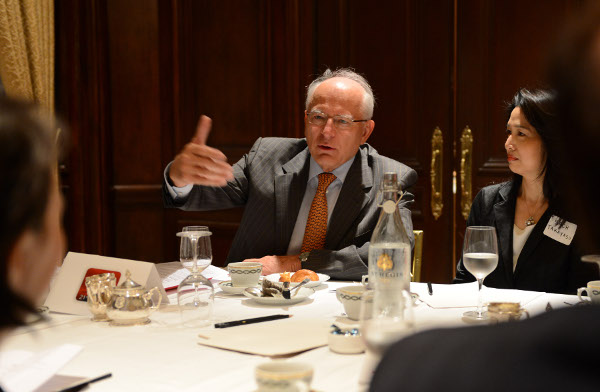
When it comes to starting a business, it is always beneficial to learn from others’ mistakes and experiences. This was the aim at the international entrepreneur roundtable discussion hosted at the St. Regis Hotel on July 11 by New York International and 21st Austria, a private initiative to foster a dialogue between Austria, Central Eastern Europe and the United States in the area of investing and business. “The United States and Austria have a lot to learn from one another,” opened Dr. Claus J. Raidl, Head of Austrian Central Bank, as he welcomed the esteemed group of entrepreneurs and industry experts who represented a wide range of age, experience, and strategy in business development. Dr. Raidl acknowledged that the United States is the “cradle of entrepreneurism,” but stated that Europe, and Austria specifically, is changing its business development model toward a more American approach, one that often begins with New York investors.Dr. Raidl expressed that the reason entrepreneurism is so much more prevalent in the states is because Americans know how to fail – failure is not the end for an idea in the US, it just means that a new approach to the idea is needed. He explained that Austria is currently fostering a new generation of people who are determined to invent and create, and will be given the chance to be entrepreneurs in a modern business environment that encourages risk-taking and rewards innovation. Sri Swaminathan of the NYCEDC then gave a short overview of the different programs and incentives the city of New York is offering to startups, which have helped to boost the number of digital startups and create a prospering ecosystem. Afterwards, the participants each spoke briefly on his or her own story of entrepreneurism, explained what challenges European and Austrian entrepreneurs will likely face when starting a business in New York, and shared one piece of advice they would offer anyone starting up in New York. As the initial discussion concluded, it was evident that many of the participants were in agreement regarding a few key areas, such as: the importance of an individual’s “story,” the legal challenges international entrepreneurs face, and the existence of cultural differences that can both help and hinder startup efforts.
Afterwards, the participants each spoke briefly on his or her own story of entrepreneurism, explained what challenges European and Austrian entrepreneurs will likely face when starting a business in New York, and shared one piece of advice they would offer anyone starting up in New York. As the initial discussion concluded, it was evident that many of the participants were in agreement regarding a few key areas, such as: the importance of an individual’s “story,” the legal challenges international entrepreneurs face, and the existence of cultural differences that can both help and hinder startup efforts.
Advice Worth Taking
Some of the top tips taken away from this lively discussion and highly illuminating run-through of challenges that international startups will face in the US were:
- Take risks – get out into the community. If you find something is not working, course-correct and take another approach. If this fails, try again – believe in your idea.
- Overcome fear – failure is always a potential risk when trying something new; don’t wait too long to experiment just because you don’t want to fail.
- Move to the US as soon as you are able, and seek out appropriate advisors to help you through the transition.
- Craft your story to each client – make it personal and memorable.
- Do your homework, but don’t forget to enjoy the opportunities that you find along the way!
Your Story is Important
Inherently, entrepreneurs have a story to tell. Every startup has a different beginning. Ali Mahlodji, one of the Austrian participants, realized the importance of having a great story when he was young; it was this realization that led him to create whatchado, an online handbook and storytelling platform. Mahlodji stressed that when he first began the process of creating a startup in Austria he was constantly advised to begin elsewhere, but he found that it was not only possible to begin a company in Austria, but that his business has since thrived and expanded with over two hundred companies now on whatchado.Anupam Singhal of Monaeo, a company that leverages location information to save taxes and protect against audits, also stated that as long as your story is relevant to the conversation and the goal of your endeavor, then people will not only enjoy hearing it, but they will connect with you on a deeper level when they reference your business in the future. Todd Barrish of Indicate Media, a PR consulting firm for startups, even advised that entrepreneurs figure out how to best “spin” their story so it is not only relevant, but that the most interesting and charming features correlate to the company’s goals.
Legal Challenges
The US system for immigration remains complex and daunting, but it can be particularly difficult for entrepreneurs. Samuel Newbold, an immigration lawyer at Barst Mukamal & Kleiner was present at the breakfast and addressed the challenges international entrepreneurs will face when they are either in, or transitioning to, the United States. He stated that for international companies a different set of rules apply for those companies that are pre-existing and wish to open a new office in the US, and those who are opening an entirely new business in the US. The participants agreed that is very important to know what the laws are (including US tax laws) before beginning the process of applying for any business-related US visa. Newbold stressed that entrepreneurs must do their homework thoroughly to avoid costly errors that waste company time and money.
Bridging the Culture Divide
The culture gap: this was a very prevalent issue that every breakfast attendee agreed was worth noting. Language differences are an obvious issue that European and Austrian companies will face while working in the United States. It’s not just knowing English that is important, but knowing popular American English. It was agreed by the participants that it is important to get to know the terminology and phrasing that is used in America, specifically in writing, so as to save your business from poor communication practices and general confusion. When looking into sales Feargall Kenny, an executive recruiter focused on technology and advertising companies, stressed the importance of getting Americans on the team quickly.It was also agreed that the manner in which business is approached and practiced is very different culturally in America than it is in Europe and Austria. In the US, you should really get to know your client, not just what they will want from you from a business standpoint. Internationals in America will want to adjust their approach when seeking a direct answer from an American business. Andreas Wuefel of Deutsche Telekom explained that Americans are much more aggressive and straightforward for the most part, but in some cases Europeans find a lack of straightforward answers. If an American finds they have not received a direct answer of “yes” or “no” in an email, after three emails, they assume the company has likely moved on and that the answer is “no” – while Europeans might be appalled by the lack of an answer.All these observations came together to paint a clear picture that while there are challenges to starting up in a new country, with proper advice and preparation, success is attainable.

